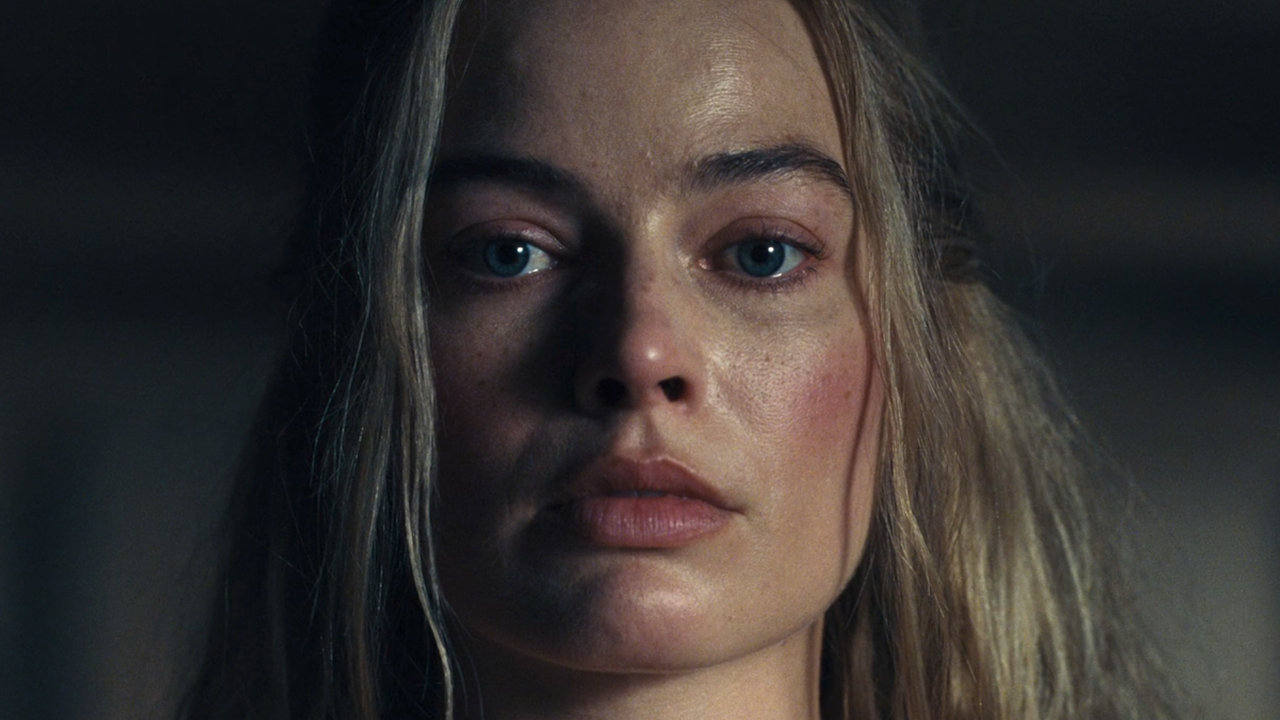Exclusive Interview: The Help Director Tate Taylor
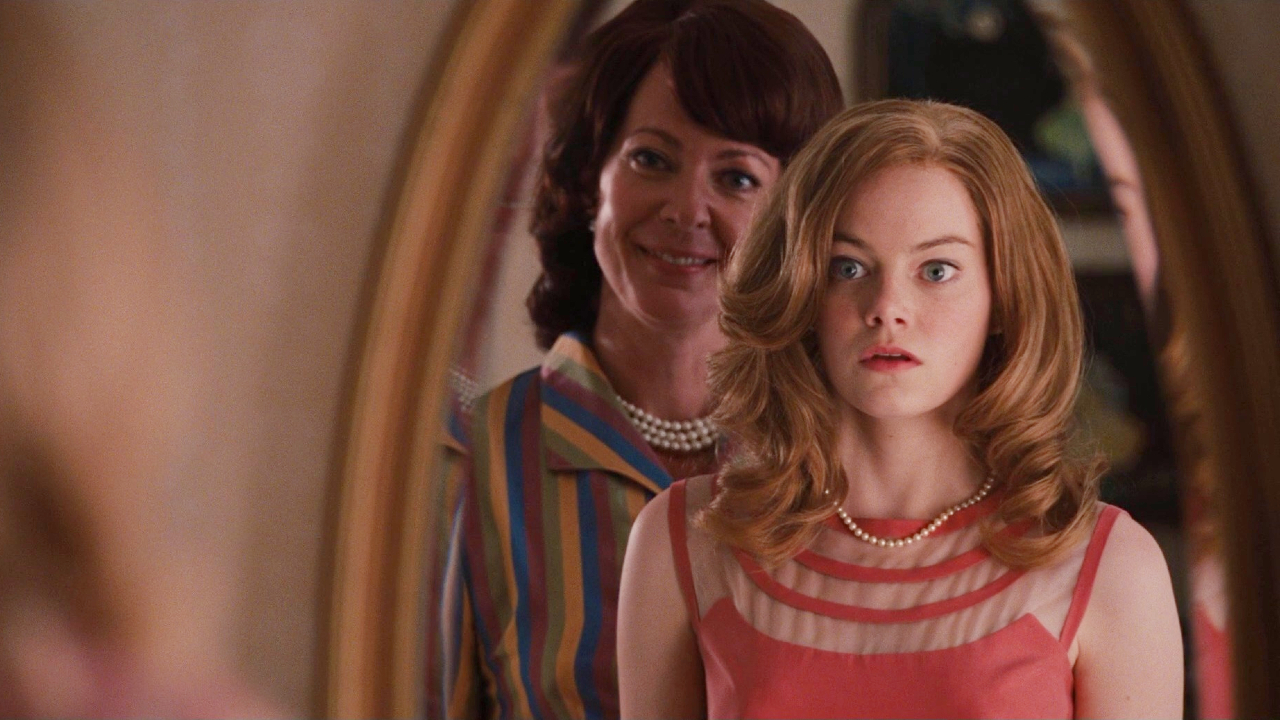
Your Daily Blend of Entertainment News
You are now subscribed
Your newsletter sign-up was successful
Seeing so many bad movies come from great books, I have to think that any author would be hesitant to let their work fall into the hands of Hollywood. The Great Gatsby, considered by many to be the greatest book of all time, has been adapted three separate times and not a single one has been comparable. In some ways Kathryn Stockett took a similar risk when she sold the movie rights to her book, The Help, even before it came out, but she had one leg up: the man she sold it to and who would end up both adapting and directing the film is her best friend, Tate Taylor.
A couple weeks ago I had the pleasure of sitting down with the filmmaker one-on-one to discuss his newest film, which comes out this Wednesday. Check out the interview below in which Taylor talks about working with Kathryn, how he came to know and cast Octavia Spencer and filming down in Mississippi.
The first question I want to ask is, I know that you actually auctioned this book to become a movie and you had a great relationship with Kathryn. I’m curious, when did you start seeing potential in the book as a film?
Literally halfway through reading the manuscript. Kathryn gave me the manuscript, she had no agent or publisher, we were in New York and she said, “Oh I want you to read it. Just tell me what you think, no one wants it.” I started reading it on a plane to LA about somewhere over Ohio I started to get this tingle. I didn’t finish it of course, it’s only a five hour plane ride, but I called her and I was like, “Kathryn, I don’t know the publishing world, but trust me, someone’s going to wise up. It’s beautiful.” She’s like, “I know, I don’t know. I gotta get comfortable if no one’s going to make it.” I said, “Let’s talk about it,” and that’s when the dialogue began. I knew over Ohio.
She mentioned earlier that she’s not too familiar with the film world, how involved was she? Like when you were working on the script, how involved did she become with that process?
Not really involved, she didn’t want to be. She’s like, “I don’t understand movies, I don’t understand scripts.” I just told her, “When I outline the whole thing before I began writing dialogue, I want to sit with you and tell me what you think.” So we met up in Central Park about a month after that and I went over what I planned to do, what wasn’t going to be in the movie, and she’s like, “That makes sense.” Then I let her read the final copy and she really liked it. Then she came to Mississippi out of support and just wanted to watch it. There was never a monitoring situation, she just loved everybody, she can tell all just genuinely love each other.
Just listening to the cast talk, when you’re sitting in the rooms and hearing people in the hallways, you really get the sense that you established this family atmosphere.
Your Daily Blend of Entertainment News
It’s like summer camp. We all, we had the best time. We all rented houses and stuff. We would all be over someone’s house having dinner and then we’d have too much to drink, we would be talking and someone would say, “I just want to stay at your house tonight.” “Okay!” It was just crazy, it really was a family atmosphere.

Sissy Spacek mentioned that it’s actually your father that gets together with at the end.
Yeah. The nightcap. That’s my dad.
I heard that actually there were some other people that you knew too.
Oh gosh, yeah. I peppered the movie with friends and family. The woman that raised me with my mom, Carol, is in the movie. Kathryn’s daughter plays the young Skeeter in the flashback, my mom is in the movie. Remember one of the first bad dates Skeeter has, “There’s Lieutenant, let’s go say hi,” and they come over there, that’s my mom who plays the Lieutenant’s wife. And my dad was in it, yeah it was fun.
Did you find that that kind of, just that personal touch kind of added to that whole atmosphere?
Not really that, it was just fun for me, from my nostalgic point of view, to know that I can go back in time when I’m older, at the end of my days, and watch the movie. It just makes it fun to have faces in there that you can remember conversations with.
I know that, on that same kind of note, Octavia mentioned that you were her roommate. I’m curious, how did you approach her? Because I also learned that the character was based on her, but how did you approach her, or did she approach you about playing a character in the movie?
It was just understood. We really are best friends. We were both PAs together on A Time To Kill, came to Mississippi, became buddies, and moved to LA together in 96. So I don’t know, when you have someone that close in your life that you share everything with, it was just, “Oh!” It was more getting Dreamworks to let me do it. Because that was the worry, she had no big credits and everybody wanted to be in this movie. Especially when there’s not so many roles for African Americans. Then I said I’d like to see Octavia do the part, so I took her down to my casting director. She went on and did a scene, showed it to everybody, they went, “She’s amazing.”
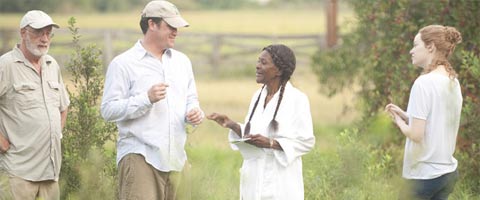
On that same kind of note, you mention that there aren’t that many great roles for African Americans, there aren’t a lot of, for women in general. Was that kind of, did you feel it was almost an active mission? Because this film really does, it has an incredible female cast and it uses every single one so brilliantly, I’m just wondering, was that an intention?
Like a goal? It was not. I’ve always been attracted to female characters, as an audience member, so I can just tell you that I was excited to mind, you noticed, which I appreciate, the possibilities, and draw out every ounce of opportunity from each of the characters of this book into the script. I didn’t want anybody just to be a, “This person is Leeroy, Minny’s husband,” and in the book you meet him and you know what he looks like and he has scenes. You know who he is. He’s the wife, he’s drunk, and so I don’t need to know him. I’d rather have more room for these women that I like.
That actually leads me to another question. Obviously this is a four hundred-plus-page book, you’re not going to be able to put in everything, and also it comes from three different perspectives. I’m just curious, for starters, the breakdown of the point of view, in the book it’s separated into Minny, Aibileen, and Skeeter, in the film you have the narration only done by Aibileen. I’m curious, was that always the case?
I knew from the start that I wanted only one person to tell the story. I said, what made this book special to me and what makes it special, period? And I realized, it was because the subject matter was dealt with and told through the eyes of the most important person, the African-American, during this time period. And I’m like, no one has really thought to do that, and that’s what it should have been the whole time. So it was a no-brainer. It’s Aibileen’s movie. That’s why I had to add Skeeter near the end, she just kind gracefully...I didn’t need, it’s Aibileen’s story.
DYou see so many movies where you have stories about minorities that are only told through the eyes of a white person. I love that this film actively goes against that.
What I’ve loved hearing some people say, we screened for a mainly African American audience in Chicago a while back and they went, “It’s so great, usually these are about civil rights leaders, Malcolm X, Martin Luther King, but this is about normal, everyday African American women doing something.” So I think that resonated too.

There is, obviously, there are tie-ins to the real world. We have the assassination, I’m curious, how, in addition to working out the book, did you do external research about the time? How schooled in it were you before taking on the project?
I’ve went and talked to people. Only just to hear them talk. A really touching thing, and she’s since passed away, I met this woman who was a hundred, this housekeeper, a hundred years old, I interviewed her. She just told me about her whole life, she’s like, “I can’t read, I can’t write, I can tell you who I was working for, and I can tell you the year, but who was president?” It was so cool. But she shared with me a story, loosely, I put a thing in the movie about it. You know when the maid tells Skeeter about the man who bought the land so she could walk to the water tower? She told me the story. I thought that was so special. It was like, in the twenties. It was a white man. I wanted to get that in there, that there were moments of taking care of each other. So I researched that way.
All of the actresses mentioned that you basically handed out copies of Eyes on the Prize. I’m curious, what was it about that documentary that you thought was so important for them to see?
Because I included, you study this during high school, and listen, you’re just trying to get through the day. I thought the images, and having it all refreshed in our heads again, would just be powerful. It’s easy to forget history or give it a cliff notes. The cliff notes of history. But mainly, so much of what happens in Eyes on the Prize happened in Jackson, Mississippi. Jackson, Mississippi isn’t really known for any other touchstone to the movement, other than Medgar Evers being killed. There were sit-ins and riots and atrocities. I just wanted them to know so they would wear it on their skin when they went back there. I also knew that it would make it kind of eerie to go there.
It definitely was a hotspot, so I’m curious, would you have made the film if you couldn’t have made it in Mississippi?
Well, once we were green-lit, of course, I would have done it. No, but I think, it would really, I think the film would have suffered. Not what it ended up as, but what it could have been. I just knew, I knew. Again, it goes back to Dreamworks and Chris Columbus and all of those guys, if it aint broke, don’t fix it. Nobody tried to fix something that didn’t need fixing. It just didn’t. It worked, I mean I know it sounds like it’s made up. It was just a great experience.
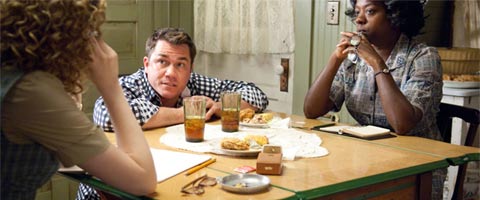
When we were talking to Chris Columbus earlier, he was talking about when they first did a location pass, and how they were able to find the location that they wanted to use in a day and a half. So what was your reaction when you found these places that you were going to film?
Well I went and found all of the locations myself before we even had financing or a studio. I knew I wanted to film in Greenwood, I knew it was going to be a struggle to get people to come to Mississippi. So I got Mark Ricker, my production designer who wasn’t even hired yet, and I brought Brunson Green, the producer, and I said, “Guys, I think I know where we’re going to film the movie.” Mark’s like, “Who’s paying for it?” “Oh, it’s not set up! No one even knows about it. But I think we need to go here and present a look book.” So we went, and we found, I grew up among a lot of those homes, so we photographed it and Mark Ricker made a book explaining the character of Mississippi. So when I met with Steven Spielberg and he’s like, “Where do you want to film it?” I went, “Here’s the book,” and I handed it to him. He was like, “Wow.” So that’s kind of, I knew I had to do that. That was one of the things I knew. I knew I had to write a good screenplay to be taken seriously, and I knew I needed to present Mississippi on visuals instead of just saying, “Hey I wanted to film it in Mississippi.” It would seem like it was a hometown boy just wanting to be home.
Did you find that as you were filming Mississippi really bled into the film?
Oh gosh yeah. I love what Mark Ricker and [Stephen] Goldblatt, my DP did. I said, “Guys, we’ve got to make it a character.” Whenever we can, how do we put Mississippi in here. Steven came up with that amazing shot, when Skeeter goes home, with the crane pulling up and her going up the stairs. Then Mark realized he was doing the shot, and they all talked about different things to place. Yes, it was a huge character.
Just the production design, I mean obviously you’re setting the movie in a different era. Just looking at now versus the sixties, we’re in a completely different universe. Were there any, was it difficult setting that up? Or did the town actually do a lot for the work for you?
No, the town didn’t do any work. Again it goes to tireless dedication from Mark Ricker, our production designer. He designed everything. I mean, those houses were in place, but what happens with the south was, every home felt like it was a set already, but all the sets looked alike. It’s all antiques. So he had the challenge of differentiating these grandson homes to fit each character, which, in a contemporary film, you just have a lot of crazy art. Or something dark, black. But you can’t here. You have to do this very surgical, precise way of differentiating. He did an amazing job.
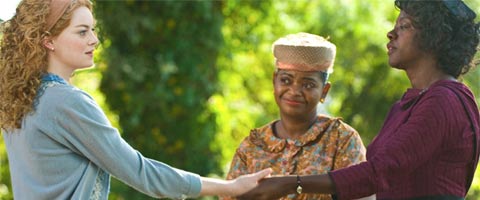
You go to some sets where the production design is absolutely impeccable, every single inch is covered with something. They just have little notes scribbled on a wall, it’s like a post it on a corkboard, but when you see the final film, so much of that is cut out because it’s not given any focus. When you’re given such incredible production design, which this film certainly has, do you find that you’re actually specifically trying to focus on those smaller aspects?
Well, we don’t, it was never, there’s really no inserts at all in the movie. There’s the shot of the pie when Hilly looks at it, but we were very careful not to do that. We wanted to make people go there and just be in Mississippi. I knew I loved Steven Spielberg when he was like, “Please don’t do close ups and don’t do all that close, I don’t want to because you’re gonna be great.” And he didn’t. A lot of things played wide, and then you’re seeing this home. You can just feel kind of voyeuristic instead of doing that TV, choppy, blah, blah, blah. You just go there. It’s not intrusive. Unless we try to do them, which is often if not always.
This obviously comes from the book as well, but the tone of the film, obviously there are some moments that are absolutely hysterical, but at the same time, it also has some dedrama, and it is dealing with a very serious subject matter. When you were writing the script, how, was it difficult to find the proper balance between that?
I think again, I had the upper hand because I’m a southerner. In the south, we tell stories. We tell stories if you’re in a sales position, if you’re in a retail position, you lure your customer by telling a story. You just do. If you were to bargain from a retailer, you tell a story. So we all just have this way of talking, and often for a southerner to be affected, you create highs and lows that are back to back, just to kind of have people, you don’t want to rip them. So I just kind of knew that would be important. If you have a piece of material that could potentially be message-y or medicine-y, always love a reversal in writing. Like when, and I think it works, when Mae Mobley’s on the toilet in the yard, and it’s so funny, and then in four seconds, she’s having her ass beat by her mother. The audience just went, “UGH!” That’s what you’ve got to do. I think it’s your job as a writer, to not let the audience get ahead, or feel a rhythm. So it’s kind of the way we talk as southerners, and it’s also, I think, your duty as a screenwriter.
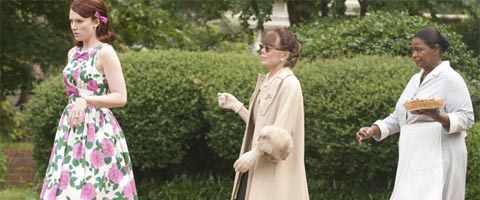
Also, when you’re working, as you mentioned in talking about the book, there’s obviously going to be some stuff that you cut out. Was there anything that you really wanted to hold on to but you had to eventually let go of?
There were just scenes that I didn’t need. There’s a scene where Hilly kicks Skeeter out of the Junior League, that’s in the book, and I shot it. It’s a great scene, it’s one of Bryce’s strongest performances. But we knew already, once she put the toilet in the yard, you just know their friendship is over. So when I took it out, and then Skeeter eating alone in the drugstore and all of her friends come in and she’s not included, that’s so much more painful as an audience member, to imagine that conversation to have happened and to see the aftermath versus, “You’re kicked out. I can’t believe you did that to me.” And that’s a great scene, I hated to lose that one. Just because Bryce was so good, she was really upset and vulnerable. Ultimately it wasn’t efficient.
I keep saying this, and I mean to say it in the greatest way possible, but to talk about Bryce Dallas Howard's Hilly Holbrook, when it comes to characters that you really just want to punch in the face, I haven’t felt this way since Election. What’s great about it is that you never let her get too cartoony, it never gets to some stereotypical place. I’m curious, what was the relationship, how did you work with Bryce Dallas Howard’s character?
She is one of the most fearless and un-sensitive people in the world. When I met her she says, “Tate, I don’t get sensitive. Beat me up. Don’t sugarcoat anything.” So we had this great, great banter back and forth. When I’d want to try something, she’d want to try something. But really, she did so much in so many different ways. In each take, it was embarrassing to cut together. We didn’t really, she’s so smart. She has a mother from Louisiana so she has a touchstone in the world, too. I just couldn’t believe her body language, I don’t know where she went and learned it when she showed up with it. Her hands and everything, and Sissy’s so smart, she copied her. That was all, when they walk out, Sissy saw her, and it’s like Mas. They’re just great actresses, I take no credit for that.
Do you know, what are you working on now?
I’ve got some irons in the fire, I’m writing an original screenplay now, just to do it.
What’s it about?
It’s a dark comedy.
Female driven?
Actually, as usual, it is female driven.

Eric Eisenberg is the Assistant Managing Editor at CinemaBlend. After graduating Boston University and earning a bachelor’s degree in journalism, he took a part-time job as a staff writer for CinemaBlend, and after six months was offered the opportunity to move to Los Angeles and take on a newly created West Coast Editor position. Over a decade later, he's continuing to advance his interests and expertise. In addition to conducting filmmaker interviews and contributing to the news and feature content of the site, Eric also oversees the Movie Reviews section, writes the the weekend box office report (published Sundays), and is the site's resident Stephen King expert. He has two King-related columns.
